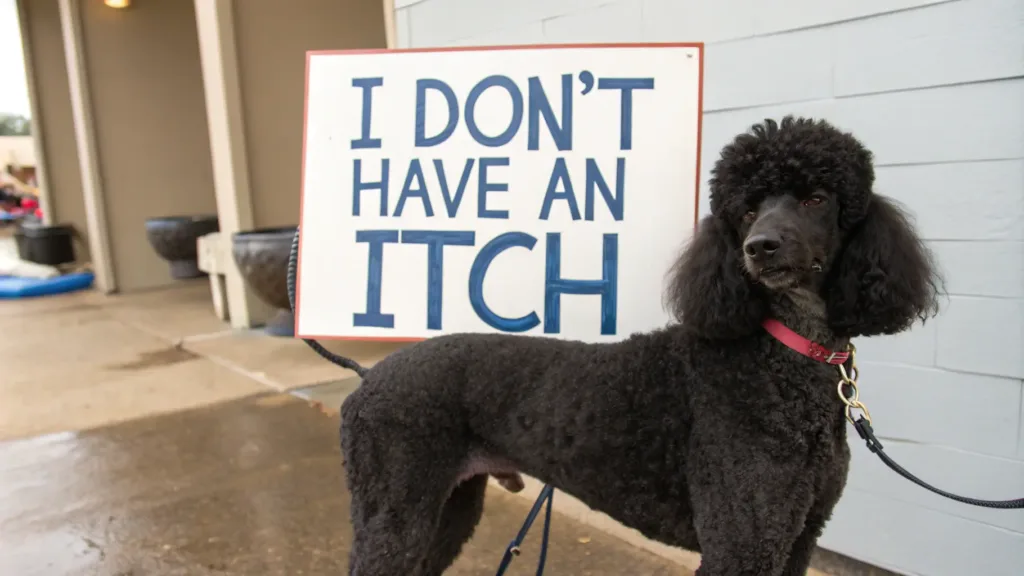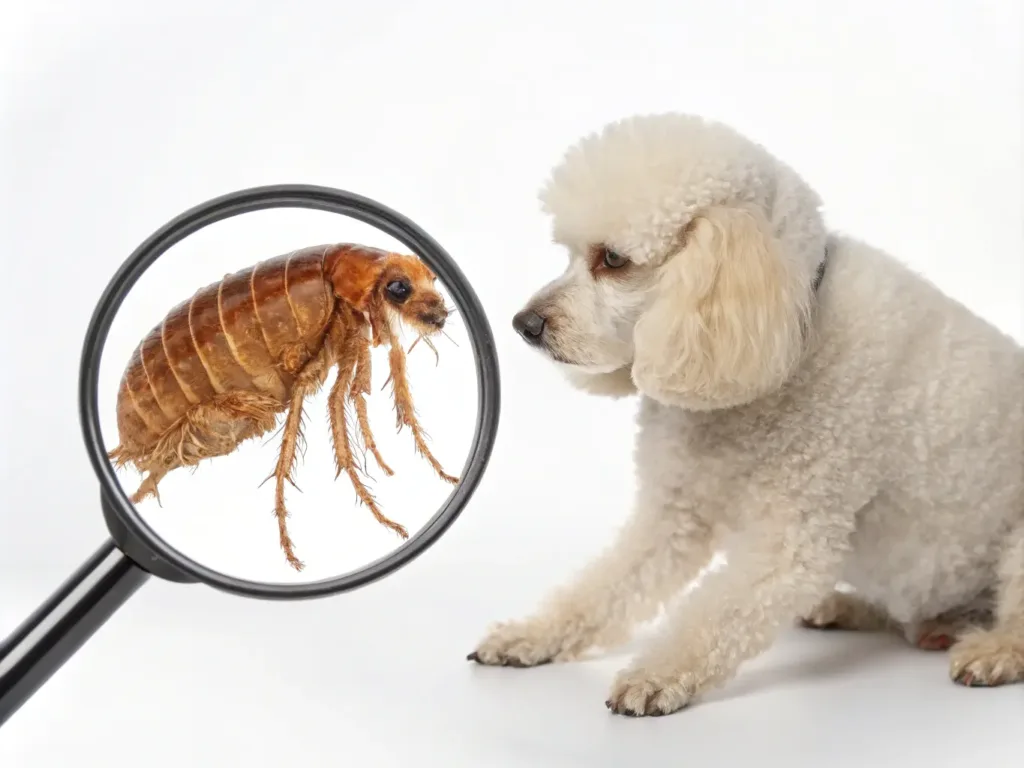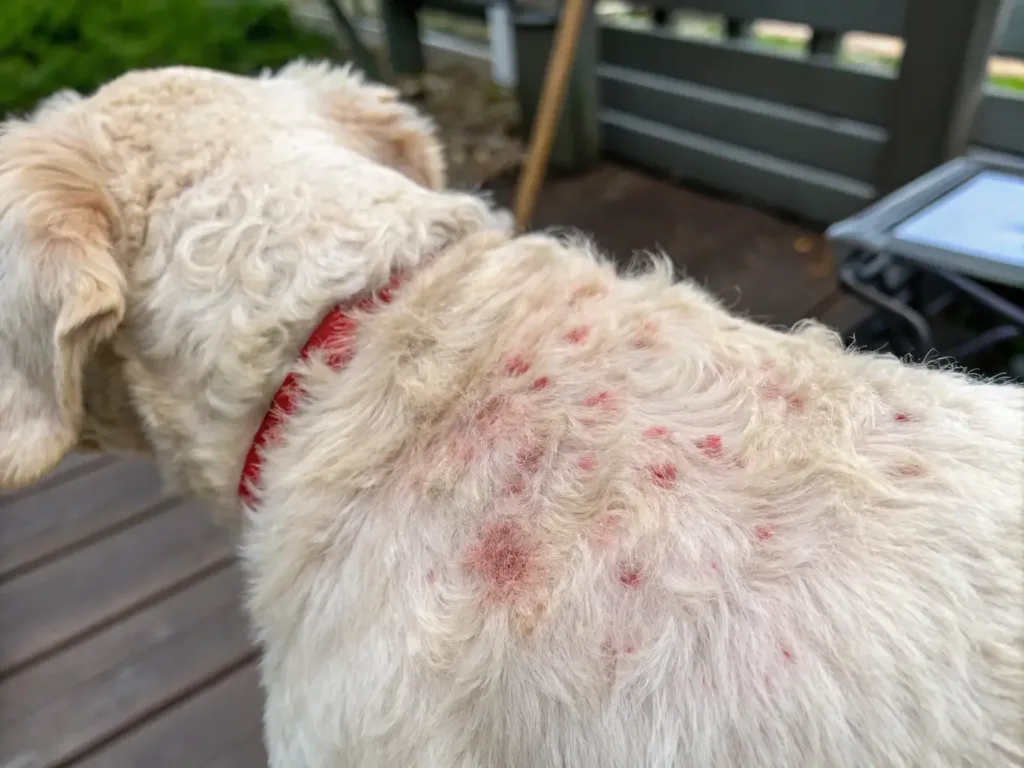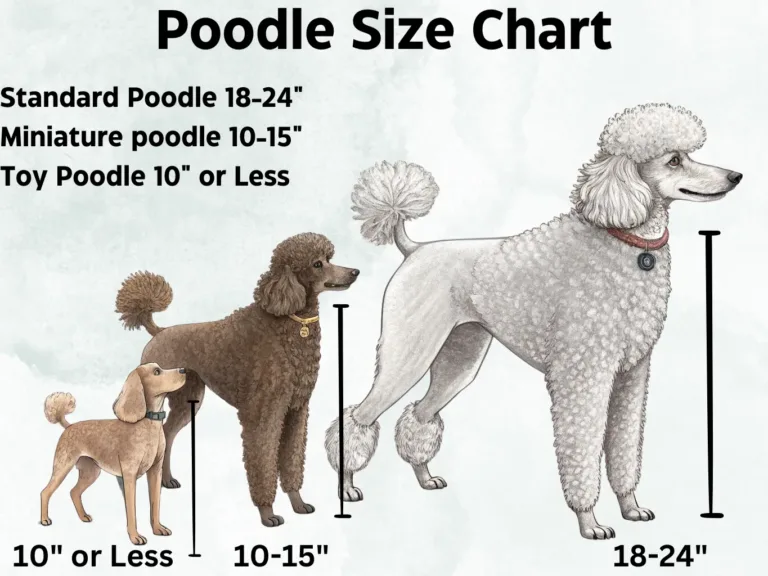Poodle Skin Problems: Identifying Allergies and Common Skin Issues

If your poodle’s scratching, licking, or showing signs of hair loss, they may be dealing with Poodle skin problems. Common issues include allergies (fleas, food, or environmental), bacterial infections, and inherited conditions like sebaceous adenitis.
You’ll notice symptoms such as intense itching, rashes, scabs, or white scaling. Regular grooming, including daily brushing and professional grooming every 4-6 weeks, helps identify problems early.
A proper diet with high-quality proteins and essential fatty acids can support skin health. When skin issues arise, work with your veterinarian to develop an effective treatment plan. Understanding your poodle’s specific skin condition will guide you toward the best solutions.
Understanding Poodle Coat Characteristics

Anyone familiar with Poodles knows their distinctive coat sets them apart from other dog breeds. The unique poodle coat comes in three main types recognized by the American Kennel Club: curly, corded, and wavy.
The most common is the curly coat, featuring dense, soft, and tightly curled hair that naturally repels dirt and moisture.
Understanding your Poodle’s coat structure is indispensable for proper care. Unlike most dogs, Poodles have a single coat that grows continuously, similar to human hair. The coat texture is remarkably resilient, and while it doesn’t shed much, it requires consistent maintenance to prevent matting.
You’ll find Poodles in various coat colors, including white, black, apricot, red, cream, grey, blue, silver, and brown. These colors can appear as solid coats or in distinctive patterns like parti-color or phantom.
To maintain your Poodle’s coat health, you’ll need to commit to regular grooming, including daily brushing and professional grooming every 4-6 weeks.
This rigorous coat care routine isn’t just for aesthetics—it’s essential for preventing skin problems and maintaining your dog’s overall health.
Common Skin Allergies in Poodles

Skin allergies in Poodles frequently pop up as one of the most challenging health issues owners face. Your Standard Poodle may experience three primary types of allergies: flea allergy dermatitis, food allergies, and environmental allergies.
Each skin problem can manifest differently, but common symptoms include intense itching, redness, and recurring infections.
| Allergy Type | Common Triggers | Key Symptoms |
|---|---|---|
| Flea | Flea saliva | Intense itching, scabs |
| Food | Proteins, additives | Ear infections, paw licking |
| Environmental | Pollen, dust, mold | Rashes, eczema |
While all breeds can develop skin issues, Poodles are particularly susceptible to certain conditions like sebaceous adenitis, an inherited disorder affecting the skin’s oil glands. You’ll need to work closely with your vet to develop an effective treatment plan, which may include medicated shampoo, antihistamines, or immunotherapy.
Prevention is essential – maintain strict flea control, use hypoallergenic grooming products, and keep your home clean. Regular bathing with appropriate products can help manage symptoms, but don’t overdo it, as excessive washing can strip natural oils and worsen skin problems.
Sebaceous Adenitis Skin Problem and Treatment
Among the most serious skin conditions affecting Poodles, sebaceous adenitis stands out as a complex inherited disorder that targets the skin’s oil-producing glands. This skin disease occurs when the sebaceous glands become inflamed and eventually destroyed, leading to a lack of natural skin lubrication.
You’ll notice symptoms like symmetrical hair loss, white scaling that’s difficult to remove, and patches of matted fur along your Poodle’s body.
When you suspect sebaceous adenitis, your veterinarian will need to perform a skin biopsy for definitive diagnosis. While this skin condition isn’t curable, you can manage it effectively with proper treatment options. Here are the key therapeutic approaches:
- Topical treatments: Medicated shampoos containing sulfur and salicylic acid, propylene glycol sprays, and emollient rinses
- Oral supplements: Omega-3 fatty acids and vitamin A supplements to support skin health
- Medications: Cyclosporine for inflammation control and antibiotics for secondary infections
Managing sebaceous adenitis requires a long-term commitment to treatment and regular veterinary check-ups. You’ll need to monitor your Poodle skin problems closely and adjust treatments as needed to prevent itchy skin and maintain comfort.
Bacterial Infections and Hot Spots

Your Poodle’s thick, curly coat can create the perfect environment for bacterial infections and hot spots to develop. Bacterial skin infections, known as pyoderma, often manifest as redness, itching, hair loss, and scaly skin.
The most common culprit is a staph infection, which requires prompt treatment with antibiotics like cephalexin or clindamycin, along with medicated shampoos.
Hot spots, or acute moist dermatitis, appear suddenly as red, moist patches that can ooze and smell unpleasant. These painful areas develop when your Poodle excessively licks or chews at their skin, usually due to allergies, flea bites, or trapped moisture.
Treatment involves clipping the hair around the affected area, cleaning with antiseptic solutions, and possibly using topical medications.
Prevention is essential for both conditions. Regular grooming helps prevent matting and moisture buildup that can lead to skin infections. Keep your Poodle on a consistent flea prevention program, and address any allergies promptly.
If you notice signs of infection or hot spots, don’t wait – contact your veterinarian for proper diagnosis and treatment to prevent the condition from worsening.
Grooming Impact on Skin Health

While treating bacterial infections and hot spots is important, proper grooming practices can prevent many skin issues from developing in the first place.
Regular grooming helps you spot early signs of problems like hair loss, excessive itching, or paw irritation before they become severe.
By brushing your poodle every 2-3 days, you’ll remove debris that could cause skin irritation and distribute natural oils that protect against mites and other parasites.
When bathing your poodle, use gentle, hypoallergenic products to avoid triggering skin sensitivities. Thorough rinsing is indispensable, as leftover shampoo residue can cause irritation that might require topical treatments or antibiotics to resolve.
Key grooming practices for ideal skin health:
- Inspect your poodle’s skin during brushing sessions, paying special attention to areas prone to matting like behind ears and under legs
- Maintain a 3-6 week bathing schedule using lukewarm water and dog-specific shampoos
- Schedule professional grooming every 4-6 weeks for proper trimming and thorough skin checks
Remember to use appropriate tools and gentle techniques to avoid causing unnecessary skin trauma during grooming sessions.
Environmental Allergen Prevention Strategies

Many poodle owners struggle with managing their dog’s environmental allergies, but implementing strategic prevention measures can markedly reduce symptoms and discomfort.
Your poodle may experience relief through an expansive approach that combines proper grooming, environment management, and dietary support.
Start by establishing a regular grooming routine, as allergens can accumulate in your poodle’s coat and trigger skin issues. Brush your dog 2-3 times weekly and bathe them using hypoallergenic shampoo every 3-6 weeks.
Since environmental allergens are a common cause of skin lesions, wipe down your poodle after outdoor activities to remove pollen and other irritants.
Create an allergen-reduced home environment by using HEPA air purifiers and frequently vacuuming. Your dog’s skin may benefit from dietary adjustments, including high-quality dog food supplemented with fatty acids to reduce inflammation.
Schedule regular veterinary check-ups to monitor symptoms and discuss potential immunotherapy options. Keep indoor humidity between 30-50% to discourage dust mites and mold growth, and use hypoallergenic cleaning products throughout your home to minimize potential irritants.
Dietary Solutions for Skin Issues

Three key dietary approaches can considerably improve your poodle’s skin health: optimizing protein intake, incorporating essential fatty acids, and ensuring proper vitamin supplementation.
If your poodle suffers from skin allergies, whether triggered by pollen, food allergies, or environmental factors, proper nutrition can provide significant relief from dry skin and irritation.
- Aim for 25-30% protein content in your adult poodle’s diet, focusing on high-quality animal proteins like salmon, which provides both protein and essential fatty acids.
- Incorporate omega-3 and omega-6 fatty acids through fish oil supplements or natural sources like flaxseeds.
- Support skin health with vitamins A and E from sweet potatoes and spinach, plus zinc from quality meat sources.
You’ll also want to add probiotics to support gut health, which directly impacts skin conditions. Maintain proper hydration by ensuring fresh water is always available and adding moisture to dry food if needed.
If you suspect food allergies, try a limited-ingredient diet to identify triggers. Remember to introduce dietary changes gradually and work with your vet to develop an extensive skin care strategy that addresses your poodle’s specific needs.
Medical Treatment and Management
Effective medical treatment for poodle skin conditions starts with an accurate diagnosis from your veterinarian.
For skin problems in dogs like sebaceous adenitis, your vet may prescribe medicated shampoos containing sulfur or salicylic acid, along with topical treatments like propylene glycol sprays.
Skin inflammation and irritation often respond well to a combination of oral supplements, including omega-3 fatty acids and vitamin A.
For severe skin allergies and inflamed skin, your vet might recommend medications such as cyclosporine or prednisone. Your treatment plan should include regular grooming sessions to monitor your poodle’s skin and coat health.
If bacterial infections develop, your vet will likely prescribe antibiotics and antimicrobial shampoos to address the skin condition.
Management of chronic poodle skin problems requires consistent follow-up care and potential adjustments to medications. You’ll need to keep detailed records of your poodle’s responses to treatments and report any changes to your vet.
Remember that some skin conditions, particularly those that are hereditary, may require lifelong management with a combination of medications, topical treatments, and specialized grooming routines.
Conclusion
Taking care of your Poodle skin problems doesn’t have to be like finding a needle in a haystack. You’re now equipped with the knowledge to spot signs of trouble and take swift action.
By staying vigilant with grooming, monitoring for allergies, and working closely with your vet, you’ll keep your Poodle’s skin healthy and comfortable. Remember, when it comes to skin problems, prevention and early intervention are your best allies.
The most common skin problems in poodles include allergies, infections, and sebaceous adenitis. Poodles, especially the standard poodle and toy poodles, are prone to a variety of skin issues. These can manifest as itchy skin, hair loss, and skin lesions. Environmental factors such as pollen, fleas, and even certain dog food ingredients can trigger these skin disorders.
Identifying a skin allergy in your poodle can involve observing symptoms such as excessive itching, redness, and inflammation of the skin. Common signs also include irritated skin, scaly skin, and lesions. If you notice your poodle scratching, biting, or licking certain areas, especially the paws or belly, it may be a sign of an allergen. A visit to a veterinarian can help confirm the diagnosis and determine the specific allergen.
Treatment options for poodle skin problems vary depending on the underlying cause. For allergies, veterinarians may recommend anti-inflammatory medications or antibiotics if there is a secondary bacterial infection. Topical treatments, such as medicated shampoos, can help soothe itchy skin. Additionally, incorporating fatty acids into your poodle’s diet may improve skin health. Always consult your veterinary professional for a tailored treatment plan.






